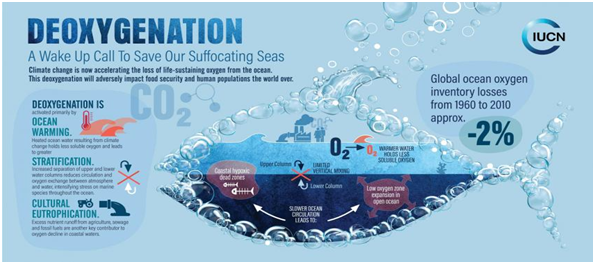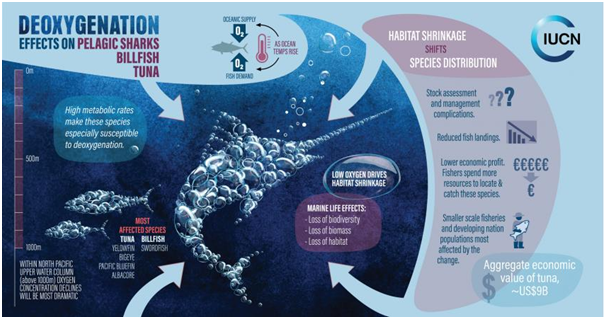

Marine life, fisheries increasingly threatened as the ocean loses oxygen – IUCN report
Context
Marine life, fisheries increasingly threatened as the ocean loses oxygen – IUCN report
About
- International Union for Conservation of Nature (IUCN) has released a report titled “Ocean deoxygenation: Everyone’s problem”.
- The report is the largest peer-reviewed study so far into the causes, impacts and possible solutions to ocean deoxygenation; and was released by IUCN at COP25 to the UNFCCC.
- With this report, the scale of damage climate change is wreaking upon the ocean has come into stark focus. As the warming ocean loses oxygen, the delicate balance of marine life is thrown into disarray.
- Large areas of the open ocean are increasingly threatened with low levels of dissolved oxygen. It is harming marine ecosystems which were already under stress from ocean warming and acidification.
- The potentially dire effects on fisheries and vulnerable coastal communities make the decisions taken at the UN Climate Change Conference (CoP25) even more crucial.
- “To drive action towards restoring ocean health” is one of the key themes of IUCN World Conservation Congress in Marseille in 2010.
What is the problem?
- Ocean deoxygenation is one of the most pernicious, yet under-reported side-effects of human-induced climate change.
- Oxygen loss from warming of oceans has alarming consequences for global oceanic oxygen reserves, which have already reduced by 2% over a period of just 50-years (from 1960 to 2010).
- Ocean regions with low oxygen concentrations are expanding, with around 700 sites worldwide now affected by low oxygen conditions – up from only 45 in the 1960s.
- In the same period, volume of anoxic waters – areas completely depleted of oxygen – in the global ocean has grown four times.
- If situation continues as is, the ocean is expected to lose 3–4% of its oxygen inventory globally by the year 2100.
- But impact witnessed at the local level will be far more severe compared to that seen on average at the global level.
- For example, impact will be more severe in mid to high latitudes.
- Most of the losses are predicted to be concentrated in upper 1000m of the water column, which is the richest in marine biodiversity.

What are the causes?
- The primary causes of deoxygenation are:
- Eutrophication (increased nutrient run-off from land and sewage pollution).
- Nitrogen deposition from burning of fossil fuels.
- Widespread impacts from ocean warming.
- Ocean oxygen loss is closely related to ocean warming and acidification caused by anthropogenic carbon dioxide emissions and biogeochemical consequences related to anthropogenic fertilization of the ocean.
- As the ocean warms, its water hold less oxygen and become more buoyant, resulting in reduced mixing of oxygen-rich water near the surface with the ocean depths, which naturally contain less oxygen.
- Nutrient pollution causes oxygen loss in coastal waters. Fertiliser, sewage, animal and aquaculture waste cause excessive growth of algae, which in turn deplete oxygen as they decompose.
What is the impact?
- The loss of oxygen from world’s ocean is increasingly threatening fish species and disrupting ecosystems.
- Deoxygenation is starting to alter the balance of marine life , favouring low-oxygen tolerant species (e.g. microbes, jellyfish and some squid) at the expense of low-oxygen sensitive ones (many marine species, including most fish).
- Some of the ocean’s most productive biomes – which support one fifth of the world’s wild marine fish harvest – are formed by ocean currents carrying nutrient-rich but oxygen-poor water to coasts that line the eastern edges of the world’s ocean basins.
- As naturally oxygen-poor systems, these areas are particularly vulnerable to even small changes in ocean oxygen.
- Impacts here will ultimately ripple out and affect hundreds of millions of people.
- Species groups such as tuna, marlin and sharks are particularly sensitive to low oxygen because of their large size and energy demands.
- These species are starting to be driven into increasingly shallow surface layers of oxygen-rich water, making them more vulnerable to overfishing.
- Very low ocean oxygen can also affect basic processes like the cycling of elements crucial for life on Earth, such as nitrogen and phosphorous.
What should be done?
- There is urgent need to dramatically raise our ambitions to tackle climate change, before human actions irreparably impact and change the conditions favourable for life on earth.
- To curb ocean oxygen loss alongside other disastrous impacts of climate change, world leaders must commit to immediate and substantial emission cuts.
- There is need to decisively curb greenhouse gas emissions as well as nutrient pollution from agriculture and other sources.




